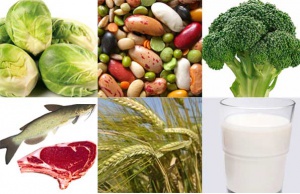Vitamin B1
Contents
Description
Vitamin B1, also known as Thiamin/Thiamine assists in metabolizing carbohydrates and the generation of energy. It is a necessary vitamin for normal nerve functioning. A water soluble vitamin B complex, vitamin B1 is essential to many cellular processes. Thiamine is required in the biochemistry of all living things: plants, fungi and bacteria synthesize it whereas animals get it from their intake of certain foods. Health and beauty benefits are numerous and include aiding the body in metabolizing fats and protein and converting foods into energy to be burned. Vitamin B1 is essential for beautiful and healthy skin, hair and nails. This vitamin assists in the normal functioning of the nervous system, the liver and all brain functioning.
Health Benefits
Health benefits of thiamin include but are not limited to: preventing and treating mental functioning problems in older people such as seen in Alzheimer's sufferers and those who suffer from epilepsy. Vitamin B1 acts as a potent antioxidant protecting the skin and body from premature aging or deterioration and the repercussions of smoking and alcohol consumption. This vitamin helps treat neurological diseases and disorders as well as improves general mental agility. It enhances circulation and helps treat heart disease, herpes and other infections.
Beauty Benefits
Vitamin B1 assists in the maintenance of healthy glowing skin, hair, nails, and eyes. It is a powerful antioxidant that protects against free radicals thereby preventing premature aging and the deterioration of eye vision and brittle hair or nails.
Food & Herb Sources of Vitamin B-1 (Thiamin)
- Barley
- Broccoli & Asparagus
- Brown rice
- Brussels sprouts
- Fish
- Legumes
- Beans
- Meat
- Milk
- Oatmeal
- Plums
- Seafood
- Soybeans
- Whole grains
- Parsley
- Peppermint
- Sage
- Spirulina
Daily Dose Recommendations
- Males: 19-70 Years 1.1 Mg
- Females: 19-70 Years 0.8 Mg
- Pregnant Females: 19-50 Years 1 Mg
- Breast Feeding Females: 19-50 Years 1.2 Mg
Deficiency
Deficiency in this vitamin will cause an illness called beriberi which affects the peripheral nervous and cardiovascular systems. In these cases, the deficiency can result in death if not treated. For less extreme deficiencies signs include confusion, rapid heartbeat and weight loss. Other symptoms may include fatigue, depression, physical weakness, constipation, loss of appetite and irritability.
